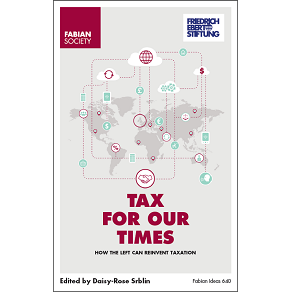Tax for our Times: how the left can reinvent taxation
The UK’s tax system isn’t fit for purpose and specialists across the board agree on the need for reform. The Institute for Fiscal Studies’ Mirrlees Review provided a comprehensive evaluation of the tax system, stressing its complexity and arguing that there...
The UK’s tax system isn’t fit for purpose and specialists across the board agree on the need for reform.
The Institute for Fiscal Studies’ Mirrlees Review provided a comprehensive evaluation of the tax system, stressing its complexity and arguing that there is an urgent need for the simplification of a tax code that currently numbers 21,000 pages. It was hailed by experts upon publication. Yet its findings and message were largely ignored by politicians across party lines, with sensible reforms being overlooked in the interests of short-term electioneering.
Aside from the heavy technical analysis too often associated with debates about tax, we urgently need a political conversation about tax reform, which considers how we tax as well as how much. The Fabian Society Commission on Taxation and Citizenship of 2000 and the more recent Values Added: Rethinking Tax for the Twentieth-Century, both set out a number of principles to strengthen the popular legitimacy of tax, as well as making it more progressive, more transparent and more efficient. Indeed, such principles are in line with public opinion, with 96 per cent of people wanting to see a more progressive tax system, according to the Equality Trust. Throughout the recent election campaign, polling seemed to suggest public appetite for more progressive forms of taxation, from support for the ‘Mansion’ Tax to an endorsement of small increases in personal taxes to fund health and social care spending.
But political action has not been taken in line with these values. Instead, tax breaks for the wealthiest have been prioritised over support for families with children, the working poor and those reliant on welfare. George Osborne’s ‘tax lock’ effectively puts 60 per cent of all taxation revenue out of reach for the duration of the new parliament: income tax, national insurance and VAT. In general, it seems that the public only gets a political discussion on tax when taxes are getting cut.
Furthermore, the tax system remains far from progressive. The most recent Office for National Statistics figures show that the poorest 10 per cent pay 45p in every pound of their income in tax, while the richest 10 per cent pay only 35p in every pound. Council tax remains distinctly regressive, with individuals occupying properties of vastly different values expected to pay roughly the same amount in taxation. The Resolution Foundation has demonstrated that extensions in the personal allowance are not only misleading in their presentation as ‘lifting people out of tax’, given that most low earners continue to be liable for national insurance contributions, but they also disproportionately benefit higher earners. We are moving towards a less progressive system, to the detriment of the many for the benefit of the few.
The public should be at the heart of debates about tax, but so far they have been crowded out by technocratic, and seemingly apolitical, contributions dominated by highlyqualified specialists. The failure of politicians to engage with the issue means we’ve yet to find a way to talk about tax that is open and accessible, enabling a conversation that we can all understand, one inspired by political values.
The left needs to fight for a tax system that treats the poorest more fairly, and fight to re-establish the principle of redistribution. Inequality suppresses productivity and increases economic instability. Conversely, a redistributive tax and benefits system will enhance social mobility, allowing people to fulfil their potential by creating a level-playing field. The left must push for this vision of society, defending the progressive purpose for taxation, and shaping its future reform by making tax debates less technocratic and more publicly accessible. The essays in this collection demonstrate how tax reform can be engaging: in sum, they outline practical proposals setting out how the left can build a tax system fit for modern times.
In chapter one, Patrick Diamond argues this requires reasserting the salience of tax as a means of redistribution, as well as for fiscal consolidation. For Tony Travers in chapter two, it is time that Britain’s hyper-centralised system learnt from its European counterparts and dispersed tax raising powers to cities and regions. Richard Murphy in chapter three thinks we must take on the vested institutional interests that allow policy-making to serve multinational corporations rather than ordinary taxpayers. Faiza Shaheen and Beck Smith in chapter four powerfully argue that the progressive global tax justice movement must avoid complacency when it comes to achievements on tackling tax avoidance, to fight for the position of developing countries in decision-making, and defend the moral case for paying tax to avoid a global ‘race to the bottom’ on tax rates. And Andrew Harrop argues in chapter five that our constrained public finances compel us to strengthen the link between taxes paid and revenue spent, not least in the interests of increasing spending on health and social care, and that this may involve learning lessons from social insurance systems on the continent. Fran Bennett also makes the case for a rejuvenated national insurance system in her case study.
As well as institutional reform, there is also a need to reconceptualise the principles and purposes of the tax system. Ann Mumford argues in chapter six that inequalities of capital need to be seen in gender as well as income terms: the left must remember that gender rights are not all about identity politics, but also concern the gendered distribution of wealth in society. Indeed, as the UK Women’s Budget Group stated after the summer budget: ‘The majority of people losing from cuts to tax credits will be women and the majority of people gaining from rising tax thresholds will be men’. The left also needs to commit itself to shifting the burden of taxation away from earned income and on to wealth, where inequalities are far greater, in order to tax property and assets far more effectively, as Howard Glennerster stresses in chapter seven. Finally, government must commit itself to lowering the tax burdens on low income families properly, by reforming national insurance (presently paid by many who are not liable to pay income tax) and indirect duties that unfairly hit the poorest hardest, as examined by Adam Corlett in chapter eight.
Crucially, tax is no longer a question within national borders, and this collection draws on international comparisons throughout. Challenges such as tackling the tax avoidance of multi-nationals require coordinated action across institutions, and the UK needs to look beyond its own borders to understand how models such as fiscal devolution might work here. Indeed, arguably the hardest ask of all, the European left must work in solidarity to pursue reforms in favour of greater wealth taxation, and easing tax burdens on lower income groups, in order to re-establish the importance of using tax as a distributional mechanism. Tax reforms with a strong social democratic impulse will only gain real political salience, and have real impact, should they follow a concerted movement across nations in the interests of fairness.
This collection offers both practical reforms and new perspectives, from giving HMRC ministerial representation and responsibility to recognising the legitimacy of feminism within tax debates. But reform must go hand in hand with creating a tax system that is legitimate in the eyes of the public. For too long, tax has been perceived as politically toxic. Yet polling throughout the election suggested that when spoken of in the right way, the public does not necessarily dislike talking about tax.
As such, more needs to be done to connect the payment of taxes to the funding of strong, popular services. Furthermore, politicians must be properly accountable to their public, providing readable, clear and understandable information about the taxes each citizen pays, how much each contributes, and how government revenue is being used.
Conducting a conversation about tax reform without the public, which pays the revenue, does not make sense. Tax reform should neither be locked away by politicians from public view, nor left to the expert few: it needs to be put back in the hands of the many

